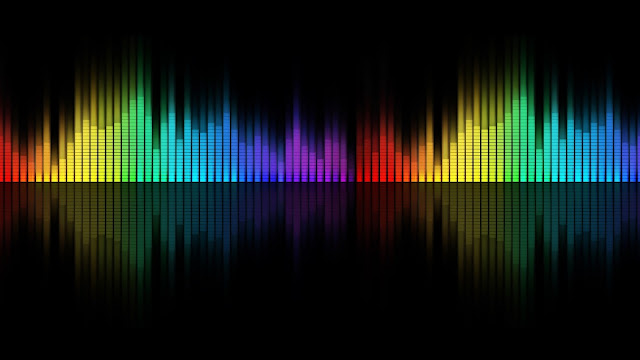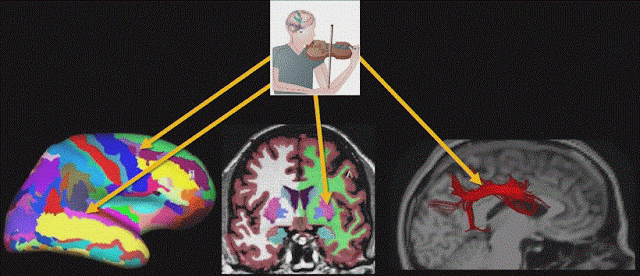Music has changed the performance of the child's brain
 |
| Music
it's part of all of our live
how did that make you feel
So have you ever thought to think why deos music do all these things for us and in particular what's going on in our brain when we make or listen to Music
well it turns out a lot is going in our brain this picture here is brain scan of a musician a pianist improvising it's form the work of charles lim and the red and blue show areas of activation and deactivation during this musical preformance what I want you to see is just how much of the brain is touched by music.
because of this scientists like myself really feel that, we can use music as a great tool to help us understand the brain but olso to change it
many people have wondered well deos music do good things for the brain is it good exercise for the brain, particularly for kids
well there's a lot of research growing research showing, that music can improve math skills reading even school attendance confidence as was talked about earlier today, but there's still a question well
what is music changing in the brain?
that enables thos improvements to happen !
Today I'd like to talk too you about a study the symphony study that's asked I'd try to answer that question,but befor that in the 2020 vision of looking ahead to the future I'd like to sketch out a vision of Education informed by brain, what know about the brain to help people meet their greatest potential.?
So consider what that would be like
imagine jeanne a five year old going to the doctor
for an annual checkup oky
like all of us she'll have her height and weight measured and the doctor will show her and her parents where she falls on growth charts of height and weight we've all seen these in fact the world health Organization, publishes worldwide growth charts that are used as standards to help us plan nutrition both for individuals and society.
But what about kids minds and brains, where's the growth chart for that?
what if 2020 the doctor could measure jeannie's brain and what if had growth charts of the brain
So that he could plot out the growth of different functions in different areas of her brain maybe some things are ahead of the curve, but circuit X or area Y maybe that's a little bit behind what would we do with that knowledge
wahat if we also know that somthing like music
could actually impact different brain areas because of it all-encompassing nature and might specifically help brain areas develop, well we could use that knowledge than to perhaps suggest the genie take up violin in an orchestra or sing in a choir,
How are we gonna get to that point we're still a long way but it's exciting time in science right now where we have brain imaging and we're starting to sketch out the developmental path of the brain for example;
this work here is from a group here in San Diego led by terry jernigan the ping project measured the brains of over a thousand people across the country from age two to twenty-two and sketches out these curves of area and thickness of the cortex the outer wrinkled part of our brains and these black lines show kind of the average growth the average trajectory of growth of these things in people, but each dot on that graph is person an individual and we really care about what's happening to their brains what happens to them next year the year after, take the thickness chart it decreases it's an apparent measure and it decreases and it's a good thing in kids because that actually reflects greater growth of connections into the cortex.
what about someone up here who has relatively immature cortical thickness
what will happen to them next will they just follow the same path that they're on and remain sort of behind the curve for their age or will they catch up converge down to the mean
And what impact would that have on this child's growing set of skills and is there anything we can do to change this to mak one scenario turn into the other ?
but the real question is how does this depend on the brain what's going on in the brain?
here's an example of another finding....
finding whaere we found that last test that we did the beat perception test turns out this area of cortex that isn't responsible for motor planning and motor execution predicts how well people do on the beat perception test?
So even if we take out all that age variation we still have this predictive rlationship, so larger motor cortex improves beat perception or at least it's correlated with so that's pretty neat we've got a perceptual process that's being shaped and influenced perhaps by motor cortex.
So it'll take us a few more years so we're really confident of these findings until we know for sure if it's music that's enlarging the cortex or this maybe some kind of inbuilt variability,
but assume that we get there let's go back to our friend jeannie she returns to the doctor two years later for next brain checkup and he finds at those areas that they had targeted with music are doing we're doing fine they're back on track.
So I'd like to end ther and just kind of remind you, Music is importent, and music and kids seems like a good but important to remember that music training isn't necessarily just for training great
musicians like we've seen earlier it can also benefit kids that aren't really musical and it particuarly maybe it'll benefit the kids that are the least musical best
so in closing I just want you take this away,
making music matters
D.r John Iversen |









